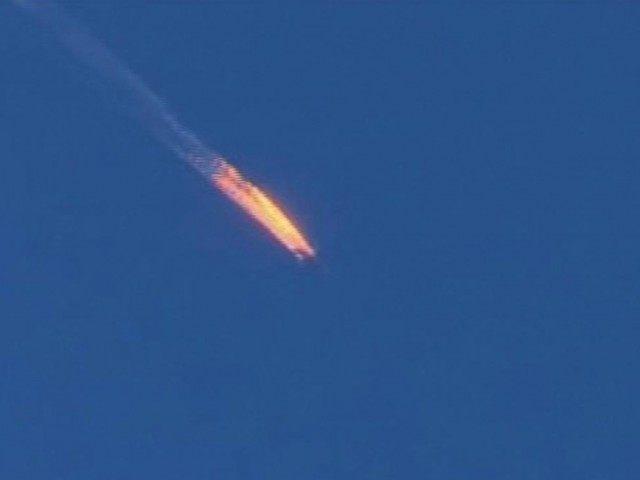The first thing to remember about the Turkish downing of a Russian fighter-jet is that it could just as easily have happened to an American aircraft. Yes, the situation in Syria is that complex; there’s plenty of risk to go around—and that’s before anyone starts putting “boots on the ground.”
Today, in the skies over Syria, the warplanes of at least half-a-dozen countries are flying combat missions: the US, Russia, Turkey, Israel, France, and, of course, Syria.
Air-traffic-control is hard enough to manage even in peacetime; it’s infinitely harder in a combat theater, where the various players have different objectives, as well as various levels of hostility, toward one another.
It’s worth noting that Russia and Turkey are historic enemies: They have fought no fewer than 12 wars over the last five centuries. So it wouldn’t take much to get them into a thirteenth conflict.
And now we have the casus belli, if the Russians want it: the downing of the Russian airplane. Moscow’s leader, Vladimir Putin, is plenty mad: He called the shoot-down “a stab in the back committed by accomplices of terrorists,” adding, “Today’s tragic event will have serious consequences for Russian-Turkish relations.”
Moreover, since Turkey is a member of NATO, a fight between Turkey and Russia would technically drag in the US and the 26 other NATO members. Why? Because under Article Five of the NATO treaty, an attack on one member-country is an attack on all.
In the midst of this high-stakes poker-ing, it’s a challenge to remember that the ostensible mission of all the countries involved is destroying ISIS. Indeed, any conflict among the air-powers is good news for the terrorist state, because if the big players fall into conflict with each other, then the decapitators of Raqqa can continue to do their evil thing.
So, for the sake of humanity—and to exact appropriate punishment on the masterminds of the Paris attacks, as well as other attacks—it’s best if Turkey and Russia step back from the brink of a confrontation that, at best, is a distraction and, at worst, could escalate into a major calamity.
But of course, we have to be realistic: In the current superheated environment, it will be hard for either Russia’s Putin or Turkey’s Recep Tayyip Erdogan to back down. Once again, this is how new wars start, and we already have an old war, on ISIS, that we need to win. One war is enough.
For the rest of us, there’s good news and bad news.
The good news is that there are well-established ways of dealing with this sort of crisis. The bad news is that they require “leading from the front,” as opposed to “leading from behind.” And so President Obama and Secretary of State John Kerry, who have been passive to the extreme in the fight against ISIS—because the only “fight” that gets them energized is “climate change”—will have to rouse themselves to and convene a true council of war.
That is, all the big outside players—the US, Russia, Turkey, Israel, and France—would have to get together and coordinate their combat missions, at least enough to stay out of each other’s way. And yes, to the extent that the Syrian regime has air assets, either in the form of airplanes or anti-aircraft missiles, it would be helpful to have Damascus, too, as part of the parley.
Two centuries ago, the brilliant French diplomat Talleyrand declared, “War is too important to be left to generals.” That is, generals, who tend to take the approach of, “Let’s knock the [bleep] out of the other guy,” are not that useful when the issue is channeling anger in a very specific direction—in this case, solely against ISIS.
So today, what’s needed, at the highest level, are purposeful politicos, who understand that Russia vs. Turkey is an unfortunate and unnecessary sideshow, distracting from the main mission—namely, annihilating ISIS.
To be sure, many will object to such a “summit conference.” As noted, the Russians and the Turks hate each other; the US doesn’t like the Russians; the Muslim powers loathe the state of Israel; and so on. So of course, it would be a challenge to get all the players around a table, refocused on the anti-ISIS mission.
Indeed, the situation is urgent, because if anyone’s plan for destroying ISIS includes ground troops, then the downside of making a mistake becomes all the more acute. “Ground-pounders,” after all, are far more vulnerable than “fly-boys.”
Once again, there’s little chance that Obama is capable of doing any of this diplomatic work—as we know, he would rather be smearing Americans. So perhaps one of the other countries will step in to mediate, cajoling the sextet of powers into some sort of working arrangement.
But let’s not give up hope on American leadership, post-Obama. And in the meantime, it would be nice to see one or more of the Republican presidential hopefuls show that they have a bit of Talleyrand in them.

COMMENTS
Please let us know if you're having issues with commenting.